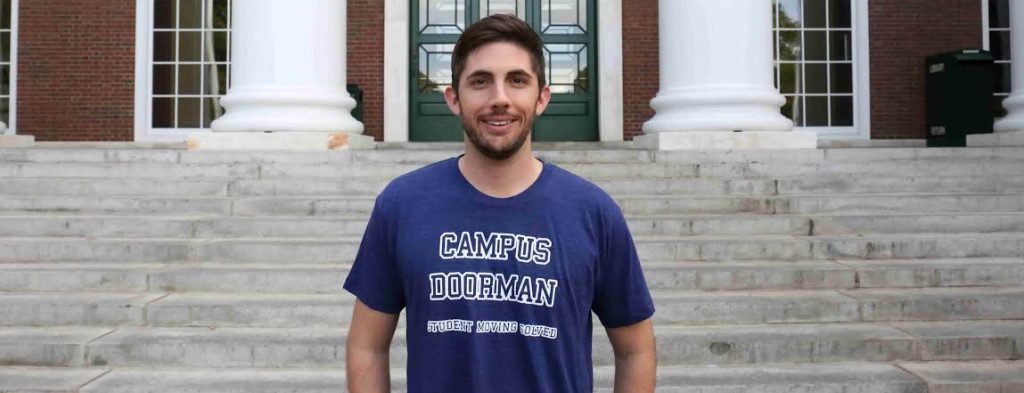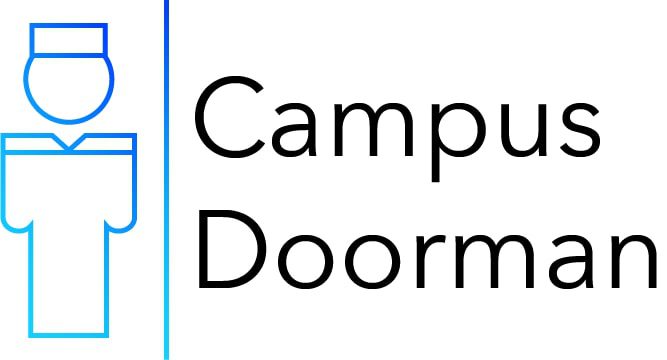Startup Lessons: Campus Doorman

The path for startups can be treacherous. In the series “Startup Lessons,” we examine new MBA startups at the ground level to understand how they succeed.
Moving is an empirical pain. Despite many of the fortunate advancements made in convenience technology, the actual physical act of moving is as furiously maddening as ever. However, Harvard Business School (HBS) startup Campus Doorman knows that pain well, and it’s here to help.
“As I moved into my place,” recounts 28-year-old Pete Rispoli, “I saw a gridlock of students and cars by the HBS apartments during move-in week. Students were waiting for hours for the elevators, parents were overwhelmed with carrying IKEA furniture, and I even saw a female student with a rope around her stomach tied to a dining set as she was crawling up the sole staircase to her 5th floor apartment.”
From there, Rispoli found a potential formula. What if most of the moving job was taken care of before you arrived? In the spring of 2016, Risoli paired with several Boston metro students in the Harvard i-Lab with the idea, which eventually turned into Campus Doorman.
The concept was simple: would students be willing to pay to have moving be taken care of early?
The company offers a variety of moving options to address needs that often vary from customer to customer. For example, students moving to Boston from elsewhere can opt to assign a “Doorman” (advisor) to oversee movers before they arrive. There’s also an Apartment in a Box™ package for students at Harvard or MIT. Starting at $249, the package allows customers to select multiple personally designed bedrooms, kitchens, bathrooms and living rooms that range from classically modern to luxurious styles. The company even assembles and organizes all the furniture accordingly, which may sound costly but usually saves hundreds of dollars on average.
Rispoli, a second-year MBA student at HBS and a 2011 Northwestern economics undergrad, is the self-professed “Chief Doorman” of the company, working alongside 27-year-old COO Brandon Oliver (a TK student at Bentley University), 20-year-old CTO Adit Chandra (a Harvard undergrad) and 10 current campus ambassadors. To scale, however, the team needed to conduct lengthy research to find if there was a viable market.
“For our company, I interviewed hundreds of students, collected purchase histories and developed a cost model to see if my solution was even feasible,” Rispoli recalls.
One of the biggest questions to answer was whether or not people would be willing to pay potentially thousands of dollars for furniture “sight unseen” with the Apartment in a Box™ package. Market research revealed that if it meant avoiding the pain of moving, the answer was yes. Those initial concerns quickly shifted to considerations of whether they could handle the demand they encountered.
Although available only to some Boston metro students at its inception, Campus Doorman anticipates moving beyond campuses in the near future. After securing funding through the Small Business Administration, the company is now planning expansion to 20 different locations in the city. Beyond the city, Rispoli notes the company is “actively hiring general managers to run operations at the top MBA schools in the U.S.”
Despite his own success, Rispoli warns other MBAs looking to join the startup game to be very conscious of how funding has altered recently.
“The funding cycle for VCs has changed dramatically over the past few years,” he says. “Companies today are being held to later-round criterion, i.e; If you are raising a seed round, you will be held to Series A metrics, so instead of just pitching an idea, you will need to show unit economics, product/market fit, etc.”
Take a look and sign up for Campus Doorman today.

